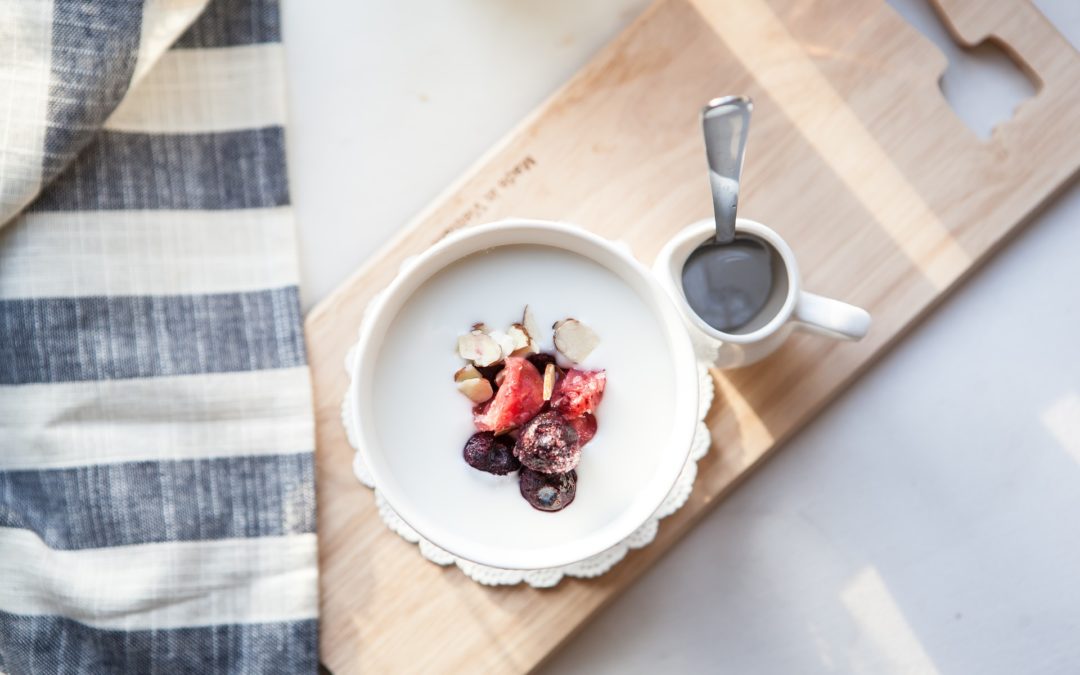Have you ever noticed how many probiotic supplements line the shelves of corner stores and grocery isles? Chances are, you’ve seen quite a few. The probiotic market is a multi-million dollar industry. Needless to say, there are a LOT of options out there. Some of them even ask a pretty hefty price. What makes probiotics so great?
I’ll admit- I’m a bit of a gut-geek. That’s because I’ve come to recognize the importance and benefits of a healthy gut microbiome. When you do too, you just might be hooked and then bacteria will become a hot topic at the dinner table (no? Just me?).
Throughout my own health healthy, gut health has continued to be at the forefront of my priorities. From crippling anxiety to full body eczema to digestive problems, the turning point in my healing journey started after learning about the importance of a healthy gut. I can’t stress enough the importance of laying a foundation for our overall health by working on healing and supporting the gut. Here’s a blog post that talks about why gut health matters.
Along with making intention lifestyle changes, one of the first places I started was introducing a probiotic supplement into my routine. It didn’t take long to see and feel results. Patches of eczema began to fade, bowel movements became more regular, digestion improved, and more.
A few months ago, I switched my whole family to a new probiotic I wanted to try out. After seeing it was cheaper than some of the previous ones I’d taken, I was honestly skeptical. “It’s too good to be true”, I thought. Let’s just say I’m SO glad I gave it a shot.
Before I share the product with you, it’s important to have a general understanding of what probiotics are and how they may be beneficial.
WHAT ARE PROBIOTICS?
First, it’s helpful to know that your gut contains an ecosystem of living organisms, otherwise known as your gut microbiome.
There are trillions of good bacteria inside you that help to break down and extract nutrients from the food you eat, improve immune function, support the integrity of your gut lining, eliminate waste, and more. This bacteria is an important part of your body’s function! Probiotics are essentially the “good” bacteria that our guts need to promote balanced health.
In the last 20 years, research has seen a relationship between irregularities in the gut microbiome and a multitude of diseases and conditions, such as diabetes, obesity, heart disease, even mental health, and more. There’s also the fascinating design of the gut-brain connection and how the gut flora (microbiome) can influence mood.
When we have more bad than good (a state called dysbiosis), our health could suffer. On the other hand, by making sure we have more good bacteria in the gut (a state that’s called symbiosis), our bodies reap the benefit of health!
POTENTIAL BENEFITS OF PROBIOTICS
Probiotics are beneficial microorganisms (bacteria) that may help restore and replenish the natural balance of good microbes in the gut. Probiotics can be added to the gut’s native microbiome and help aid in the fight against bad bacteria.
Research suggests probiotics may be beneficial for:
- Improving Digestive health
- Promoting bowel regularity
- Relieving gas and bloating
- Supporting brain function
- Strengthening the immune system
- Supporting the body’s natural inflammatory response
Here are a few studies that were done with probiotics. In one study, researchers found that the gut of individuals who consumed probiotics had different gene expressions in their intestinal lining compared to the control group (2014). Here’s another study where probiotics were provided to individuals suffering from esophagitis. It was found that the probiotics promoted the expression of different genes involved in both immune response and inflammation.
Studies have shown that different probiotics have been shown to prevent or treat a pretty wide range of health issues, including respiratory tract infections, eczema, infant colic, certain types of diarrhea, necrotizing enterocolitis, bacterial vaginosis, urinary tract infections, etc. (Goldin, 2008; Kaur, 2009; Taibi, 2014). Research about the gut microbiome is, however, still relatively new and I imagine there to be further research done on humans to understand the full effectiveness of probiotics in treating or preventing disease.
WOULD I BENEFIT FROM PROBIOTICS?
Research has traced a vast array of diseases back to the condition of the gut. There are many things, such as a diet high in processed foods, antibiotic use, stress, travel, that can harm the good bacteria in our gut. When it comes to our overall health, there are many things outside of our control. For example, what we (or our guts) were or were not exposed to growing up and current environmental factors can even have a collective influence on the balance of bacteria in our gastrointestinal system.
In a recent post, I talked about some of the common things that pose a serious threat to our guts today. I also shared a few suggestions about how you can start to start to support your gut.
In my opinion, most people would benefit from including more probiotic-rich food in their food choices. Particularly in the case of constipation, bowel irregularity, leaky gut, digestive problems, bloating, yeast and urinary tract infections, after antiobitoci use, or if a diet is very low in naturally live-cultured bacteria (some foods will be listed below), target use of supplementation of probiotics may be beneficial.
This does not mean that there are no exceptions or conditions in which particular strains of certain bacteria may interfere with someone’s condition. With all health concerns, and for peace of mind, consider discussing with your health practitioner if probiotic supplementation is right for you. Ultimately, bio-individuality applies and this decision comes down to the individual and his or her needs.
HOW TO INCORPORATE PROBIOTICS INTO YOUR ROUTINE
FOOD
Incorporating probiotic foods into your diet is a great way to feed the good guys in your gut. Fermented and cultured foods contain naturally occurring live active bacteria, Examples of fermented foods are kimchi, sauerkraut, kefir, tempeh, pickled vegetables, miso, and kombucha.
It’s also important to consume prebiotic foods. These are high fiber foods that essentially feed the probiotics. Prebiotics fuel the good bacteria in your gut and you want to make sure they’re getting some goodies to continue doing their job for you. Examples of prebiotic foods include things like include onion, garlic, banana, asparagus, Jerusalem artichoke, and dandelion greens.
When I recommend probiotics to some folks, they asked me about yogurt. “I eat some yogurt each week. Isn’t that enough?”
High protein, low sugar yogurt (like Greek for example) contains probiotics and can be considered a healthy option for breakfast or snack items. Chances are, if you turn your yogurt over, you’ll see one or a few strains of bacteria listed. Common strains of probiotics in yogurt are Bifidobacterium and Lactobacillus. This is a start, but multi-strain probiotics are more effective at promoting digestive health.
There is a wide range of probiotic-enriched foods on the market with a “health halo”. In other words, they must be God’s gift to earth just because they’ve got a “contains live cultures” or “probiotics” label. Just don’t let this label distract you from the list of potential hidden ingredients on the nutrition label though!
SUPPLEMENTATION
Another popular way to incorporate probiotics is by taking a probiotic supplement. This may be a better option if you’re looking for measurable improvements in the gut and overall health. It can be tough to get high volumes of diverse probiotic bacteria from food alone. I know I don’t always eat probiotic-rich foods every day.
A QUICK WORD
Whether you decide to be pro-probiotic or not, here’s the honest truth when it comes to health and healing. There’s no quick fix. Anyone I’ve met that’s been on a health and healing journey, and I’ve met quite a few, learned this same thing. So if you decide to give a probiotic a try, or any supplement for that matter, know that it will likely take time to yield results or notice differences.
When I started probiotics, my digestion problems, skin issues, constipation, anxiety- not of it vanished overnight. It took a few weeks for change but I do believe the probiotics helped tremendously.
During the times this felt disappointing, I reminded myself that most conditions don’t just happen overnight. I didn’t just wake up with leaky gut syndrome one day. It was a steady exposure to things overtime that did more harm than good to my gut lining. It has also taken time to undo some of the damage.
In my own journey to healing my gut, I’m grateful to say I’ve made significant progress (at one point I was covered in itchy, inflamed eczema that I believe to have been heavily contributed to leaky gut and gluten-intolerance). However, I’m still on this journey.
Everyone’s health and healing journey is like a unique recipe.
In my case, the recipe’s been some trial and error, a bit of lifestyle change, a dash of dietary adjustments, a good bit of intentionality, and a whole lot of surrender to the process. One of the intentional choices I did make that proved beneficial was incorporating a quality probiotic into my routine.
SOURCES
Goldin, B.R.; Gorbach, S.L. Clinical indications for probiotics: An overview. Clin. Infect. Dis. 2008, 46, S96–S100. [Google Scholar] [CrossRef] [PubMed]
Kaur, I.P.; Kuhad, A.; Garg, A.; Chopra, K. Probiotics: Delineation of prophylactic and therapeutic benefits. J. Med. Food 2009, 12, 219–235. [Google Scholar] [CrossRef] [PubMed]
Plaza-Diaz J, Gomez-Llorente C, Fontana L, Gil A. Modulation of immunity and inflammatory gene expression in the gut, in inflammatory diseases of the gut and in the liver by probiotics. World J Gastroenterol. 2014;20(42):15632–15649. doi:10.3748/wjg.v20.i42.15632
Taibi, A.; Comelli, E.M. Practical approaches to probiotics use. Appl. Physiol. Nutr. Metab. 2014, 39, 980–986. [Google Scholar] [CrossRef] [PubMed]



